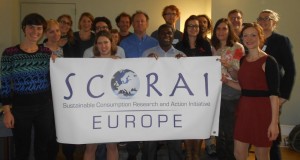London (2014)
SCORAI (Europe) & Kingston University Sustainable Consumption Workshop
30 September – 1st October, 2014, Royal Society of Arts, London
A two-day workshop on Sustainable Consumption was held at the Royal Society for the Encouragement of the Arts, Manufactures and Commerce. Its goal was to develop our understanding of innovative approaches to sustainable consumption by sharing and reflecting upon research and practice relevant to themes suggested by participants in recent SCORAI Europe workshops.
Themes
1. Action: roles for researchers and practitioners in developing and diffusing sustainable practices
Participants were encouraged to reflect upon the contribution their work makes, or may potentially make, to understanding better sustainable practice(s) and the actions that are being taken to realize this – whether these are the work of activists, other practitioners or researchers. Contributions to the workshop reflected on the roles of researchers and practitioners in such processes.
2. Integrating sustainable consumption and production
The second theme concerned the interactions among sustainable consumption and production, or consumers and producers. Here, workshop contributions considered questions such as: What approaches to activist or user led production for reduced consumption may be identified? How have they been able to accomplish what they achieve? What factors impede their progress? What difference do such actors make to the realization of sustainability goals?
3. New perspectives and methods
The third theme concerned perspective and methods (or methodologies). Here, workshop contributors were invited to share their thoughts about how we learn about what is happening in the name of sustainable consumption, or what could be done in its name. Discussions revolved around the continued relevance or insight to be gained from (for example): practice theory; action research; institutional theory; discourse analysis; transition theory, co-design, design activism, notions of the ‘good life’, and so on.
Participants
The London workshop was attended by a diverse mix of 20 practitioners and academics from the UK, EU, US and Japan, and included researchers from the fields of innovation, science and technology studies, geography and sociology, and activist design. The workshop findings emphasized:
- The myth of ‘sustainable consumption’.
- The paradox of rebound effects associated with the adoption of measures to reduce consumption.
- The importance of understanding the relationship between consumption and production.
- The propensity of sustainable innovations to fail to live up to expectations.
- The potential contribution of DIY and ‘slow’ design and the sharing economy to reduce consumption though acknowledging the capacity for international capital to undermine or co-opt citizen action and modes of provisioning based on social solidarity.
- The significance of combinations of social practices, institutional rules, entrepreneurial design activists (e.g. urban farmers) and supportive policy and social structures and material infrastructure to making ‘real’ transformations which have the potential to endure.
- The importance of historical perspectives to understanding innovation success and failure, the ‘life course’ of consumers’ relationships with use (e.g. in relation to transportation or using energy in the home) or learning from the past exemplars such as the socially useful production movement of the 1970s.
- Mutually productive and problem-centered engagement among practitioners, academic researchers, policy and business actors.
The Workshop was convened by Audley Genus, YTL Professor of Innovation and Technology Management, Kingston University London. Keynote speakers included Adrian Smith, SPRU, University of Sussex and Ann Thorpe (design activist). The workshop was the latest in a series of events organized by the research networks SCORAI Europe and SCORAI North America. It was funded by Kingston University from the YTL Corporation donation which endows the Chair held by Audley Genus (a member of SCORAI) and funds the salary of the research assistant Mara Iskandarova who helped to organize the workshop. SCORAI members Frances Fahy and Maurie Cohen assisted with chairing panel sessions and the review of abstracts submitted to the workshop (which was oversubscribed).
Presented papers may be published in a SCORAI-led journal special issue and/or edited book. A contract has been signed with the publishers Springer for an edited book, based on workshop presentations and discussion. Negotiations are in progress with the editor of Technology Analysis and Strategic Management about the Special Issue.

